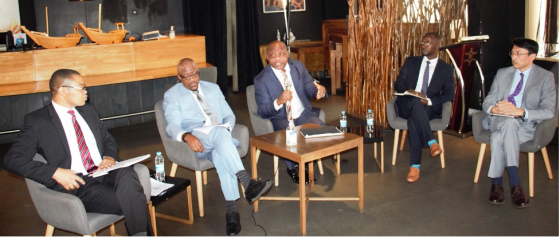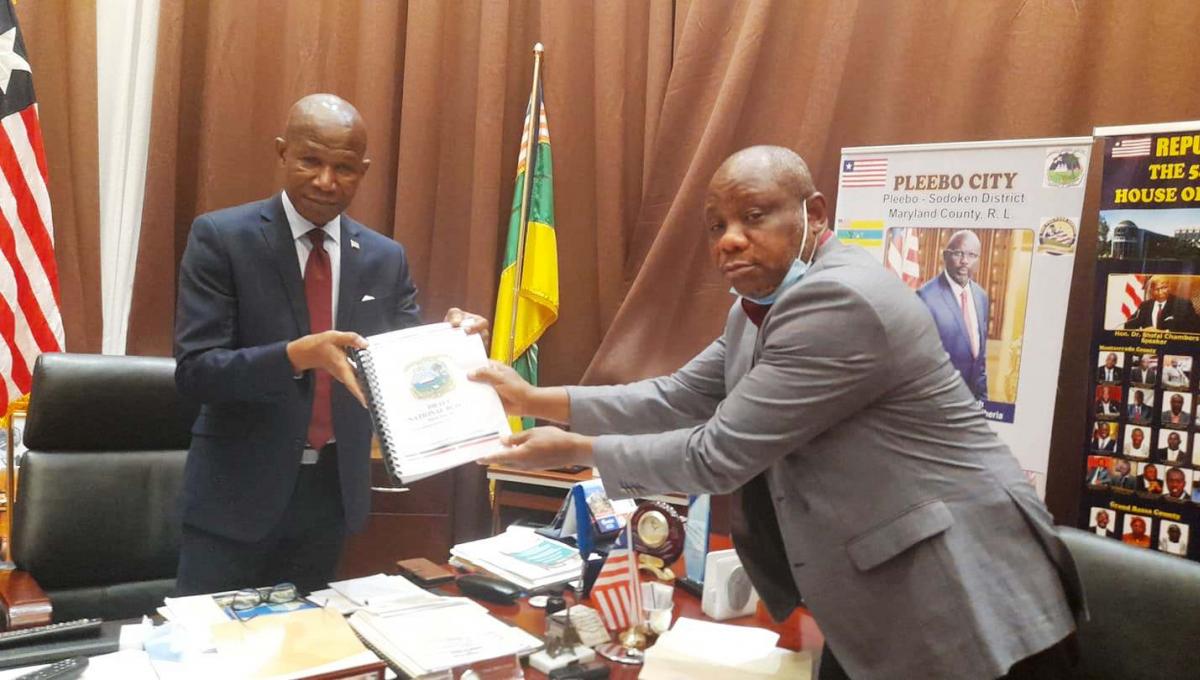World Bank Worries about Liberia High Recurrent Expenditure

From left: World Bank Liberia Country Manager Khwima Nthara, CBL Governor J. Alloysius Tarlue, Finance Minister Samuel D. Tweah, Jr., Alieu F. Nyei, Senior Research Fellow, Center for Policy Analysis and Research, and IMF Resident Representative, Adar Abdychev.
The administration of President George Weah may have managed to stabilize the economy after a turbulent start, but the country’s high level of recurrent expenditure has become a point of concern for officials at the World Bank.
The Bank expressed its concern just a few days after the Minister of Finance and Development Planning, Samuel Tweah submitted to the Legislature a budget envelope of US$785,587,340.00, to fund the ambitious development agenda of President George Manneh Weah.
However, a massive chunk of the budget goes into servicing public debts, contractual obligations; and clearance of arrears.
In a report on the Liberia Economic Update, the World Bank called on the government to reduce the high level of recurrent spending and strengthen domestic revenue mobilization to generate savings for public investment financing.
“Between 2012 and 2020, government operating expenses exceeded the domestic revenue it collected by 4 percent of GDP. This means that the external resources mobilized in the period financed a significant part of the government’s operating expenditure instead of financing public investment in infrastructure,” the World Bank said in a hardcopy report.
The report added that despite the government achieving success in a positive turnaround in macroeconomic fundamentals, fiscal gains need to create enough fiscal space to finance the country’s massive investment needs in physical infrastructure.
“The recent efforts to reduce duty waivers and the successful implementation of the pay and payroll reform are steps in the right direction and need to be complemented by actions to improve the efficiency in the consumption of goods and services by the Government,” said Mamadou Ndione, Senior Country Economist and main author of the report.
The World Bank report mirrors information captured in the Ministry of Finance budget circular document that the country lacks enough funds to create the fiscal space needed to support a resilient recovery since policy options for increasing fiscal space are based on debt sustainability, external assistance in debt relief, debt service suspension, debt restructuring, and concessional loans.
The ministry also noted that, at a time when the country is faced with a falling growth rate and being classified in the category of a moderate rate of debt distress, the situation has inhibited the government’s ability to borrow to finance projects.
At current, the government account deficit, according to the Ministry of Finance, is projected to widen to 22.3 percent of GDP in 2021 and further to 22.8 percent of GDP in 2022, while the country’s total debt stock as of the end of February 2020 stands at US$1.47 billion, of which domestic debts account for US$604.4 million.
External debt stock accounts for US$861.8 million, with multilateral institutions accounting for US$748.3 million, and bilateral sources, US$113.5 million. Of the domestic debts, the Government of Liberia owes the Central Bank of Liberia US$487.5 million; commercial banks, US$65.2 million; other institutions, US$51.5 million; and claims, US$0.2 million.
Meanwhile, the World Bank in its report has called on the government of Liberia to invest in people and institutions to create an educated, skilled, and healthy labor force, in both the public and private sectors, as a means of protecting the economy.
The Bank noted such investment is needed to also safeguard the country’s vulnerable population against repeated exogenous shocks. The report further said that the drop in world oil prices in 2020 allowed some easing in Liberian fuel prices, a frequent driver of inflationary pressures, although the decline was moderated by the introduction of an excise tax early in the year.
Economic growth, according to the report, is expected to recover to 3.6 percent in 2021, before rising gradually to an average of 5.2 percent over the years 2022 to 2025 and will be driven by the expected recovery in the mining sector, underpinned by the recent uptick in commodity prices.
“A major challenge to the country at this crucial time is that those debts previously contracted on concessional terms are coming due now,” disclosed Samora Wolokolie, Deputy Minister for Fiscal Affairs at the Ministry of Finance in a speech at the Ministry of Information Cultural Affairs and Tourism in August. “Thus, with falling growth rate and revenue, rising expenditures, and widening current account and fiscal deficits, the country risks defaulting on its debt service obligations.”
However, the macroeconomic outlook for the fiscal year 2022, made available by the Ministry of Finance, assumes that high levels of uncertainty around the evolution of the COVID-19 and its likely impact on external demand and global and domestic supply chains; and unaddressed vulnerabilities in the financial sector could undermine economic recovery, increase poverty, and weaken Liberia's fiscal and external balances.
Dr. Khwima Nthara, World Bank Country Manager for Liberia added that the government should be commended for making tough policy choices that have resulted in this positive turnaround in macroeconomic fundamentals, especially under a challenging COVID-19 environment.
“The Government must be commended for making tough policy choices that have resulted in this positive turnaround in macroeconomic fundamentals, especially under a challenging COVID-19 environment,” said Dr. Nthara said. “The focus now should be on complementing the improved macroeconomic environment with critical structural and governance reforms that will help boost domestic and foreign private investment to create more jobs,” he added.
In opening remarks, at the unveiling of the report, World Bank Country Director for Ghana, Liberia, and Sierra Leone, Pierre Laporte, commended the government for significantly improving their fiscal space in recent time, especially considering the COVID-19 pandemic.
Even before COVID-19, he said, Liberia’s economic situation has been very challenging.
“I remember coming here two years ago. The inflation rate, especially the rise in dollarization, was quite challenging and it has been very encouraging the last couple of years to see Liberia making notable progress. Now we have seen much improvement in the fiscal framework, inflation coming down, appreciation in the exchange rate; and these are good signs of adequate monetary policy of a country. So we will like to congratulate you on that,” he said.

